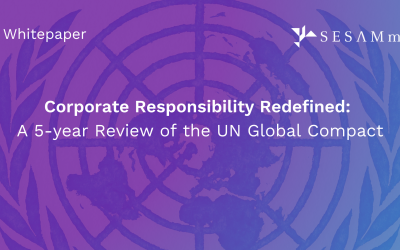Faryda Lindeman, NN Investment Partners, on the impact of COVID-19 on sustainable finance
Faryda Lindeman from NN Investment Partners talks to Climate Action about the impact of COVID-19 on sustainable finance.

Making an impact through investing: has COVID-19 refocused sustainable finance?
Q. Do you think COVID -19 has shone a much needed light on ESG and impact investing?
A. Volatile markets, coronavirus statistics, plummeting oil prices and speculation on the shape and speed of the recovery have all kept investors absorbed in the first few months of 2020. The far-reaching impact of the pandemic will remain with us certainly for months and probably for years. But the long-term trend towards investing to create a more sustainable world may even be strengthened by the ongoing impact of the coronavirus. Priorities that were already shifting may change faster. In addition to solid financial performance, investors increasingly want to contribute to a better world. As an asset manager investing on behalf of others, we have a responsibility to deliver attractive risk-adjusted returns while putting the capital we manage to work.
If one thing is sure in the current environment of uncertainty, it is that this crisis has increased investors’ focus on environmental, social and governance (ESG) factors. This is particularly true for social aspects. In recent years, the focus has largely been on environmental concerns, but many of the questions raised by the current crisis are societal ones: how are companies supporting their employees, and how do we stay connected throughout this period of social isolation? Governance is also a crucial factor. It’s now more evident than ever which companies are able to navigate this period of uncertainty without being punished for bad capital allocation or frustrating equity investors by issuing new shares.
Q. How do you achieve the right balance in responsible investing between shareholders, people society and the environment?
A. Responsible investment is about having a positive effect on the well-being of society and the environment, but it also enables us to unlock potential financial value and have an improved risk adjusted return. You can assess and look at this in a variety of ways. Every sector is exposed to other ESG factors, and you have to understand which ESG factor is most material to a company. So for one company we have to assess the carbon emissions, the water intensity or waste output, in other sectors we have to focus on job creation, innovation power and gender diversity, and there are many other examples. This also means we cannot just have a preference for one ESG factor over the other, we have to balance them out. If companies act in a responsible way this towards the greater society, it also benefits shareholders.
Q. What inspired you to think differently and diversely about sustainable and responsible investing? Do you think COVID-19 will refocus society, international governments, financial institutions and corporates as to the importance of climate change and financing for a sustainable future?
A. There definitely is a change coming. Covid-19 has shown that companies have to focus on the long-term treatment of employees, customers, contractors and suppliers, and thereby also prioritize their needs over shareholders. Companies should act in a responsible way, work with suppliers, employees, unions, governments, and investors to come up with solutions that enables economies and society to stay safe from harm. Company purpose has been an important factor. Do companies have a purpose and are they living up to these expectations?
Governments are a dominant market driver in the short term. The first focus will be first on ensuring survival, but the second step is shifting towards a situation that enables a healthy and sustainable economy and society. Something that is currently unclear however currently is how governments will push for ‘Greenification’ requirements as part of economic recovery packages and fiscal stimulus policies. We have seen some requirements for airlines, but otherwise it has been unclear what the requirements are. It is important that governments keep continue to push for more sustainable practices.
In terms of society, I can only hope that people start seeing the benefits of living in a different way. This crisis has shown that we all need to adapt, the way we consume, treat the environment and others.
Q. What influence do shareholders have in encouraging corporates to adapt and change: will this relationship be redefined in the midst of a pandemic? What are the developments in emerging market economies?
A. Engagement was important for the relationship between investors and companies, but the pandemic has put a greater emphasis emphasize on it. As investors we should also encourage companies to prioritise employees, contractors, suppliers and the longer term health of the company itself over bonuses for executives, buy-backs and dividends for shareholders. We should also engage with companies on topics such as health and safety, and how they are coping with the Covid-19 crisis. Where does it have an impact, how are they managing this, are they seeking government support, what are the effects for employees? We have seen already that the pandemic had a massive impact on emerging economies, for instance in the garment sector where there have been massive lay- offs since supplier contracts were cancelled. Many emerging economies closed businesses due to the pandemic, and it has caused financial distress and uncertainty for many people.
Q. How can businesses secure higher returns whilst having a positive social impact?
A. These two elements go hand in hand. Companies cannot secure a higher return, whilst hurting society in any way. This will backfire negatively on companies, as we have seen with many company controversies. A company’s purpose is increasingly important in positioning and in defining its role and responsibility in society, and this will continue for the near future. Issuers are requested to act not only with an eye for share or bondholders, but also to act in accordance with the needs of stakeholders such as employees and go beyond legal requirements. The license to operate will become a license to exist and when the license expires existence will become dire. Increased attention for real economic impact and intentionality of business activities instead of symbolic corporate philanthropy without a clear link to the business operations and real economic impact.
Q. How do you think responsible investing will change in the midst of a pandemic?
A. I think the social factor will probably dominate the environmental factor for now, perhaps with an increasing interdependence between the E and the S factor. I think Covid-19 has shown that a healthy planet earth is essential for human health. In additional there will be more focus on health and safety standards, and how companies are treating their employees, customers, and suppliers and society in a greater sense.
In addition we have seen changes to proxy season. Many companies have organized their shareholder meetings on a virtual-only basis, making it difficult for shareholders to raise questions or to have a discussion on different topics during the AGM. The current situation might just trigger a long term change, with companies rethinking their AGM and the way they organize it. Virtual AGM’s might become the new normal.
Faryda Lindeman will be sharing further insights during the 'How is COVID-19 refocusing sustainable finance?' webinar on Wednesday 10 June at 13:00 BST/GMT+1. Register here.






